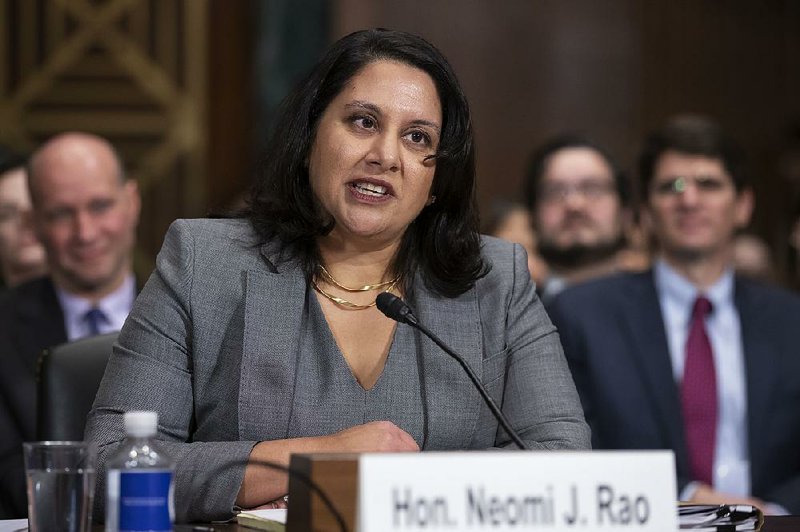WASHINGTON -- The Senate Judiciary Committee voted Thursday to advance President Donald Trump's nominee to replace Brett Kavanaugh on a high-profile appeals court.
The committee voted 12-10 along party lines to endorse Neomi Rao for a seat on the U.S. Circuit Court of Appeals for the District of Columbia Circuit. Trump nominated Rao for the seat left vacant when Kavanaugh joined the Supreme Court last fall.
Rao, 45, heads the White House Office of Information and Regulatory Affairs, where she plays a key role in Trump's efforts to roll back federal rules and regulations. She also worked in the George W. Bush White House but has never tried a case in state or federal court.
Rao's confirmation was in doubt after two Republican senators on the committee expressed concerns about her past writings.
But Missouri's Sen. Josh Hawley and Iowa's Sen. Joni Ernst joined with GOP colleagues to move Rao's nomination to the Senate floor. All 10 Democrats opposed her.
Hawley has said he's unsure about Rao's position on abortion, which Hawley opposes. He also questioned her views on judicial activism and individual choice.
But he said Thursday that after meeting with Rao he is convinced she would interpret the Constitution "according to its text, structure and history" and not current social mores.
Hawley, a freshman, was criticized by conservative groups and The Wall Street Journal editorial page for raising questions about Rao, but said he will vet all judicial nominees thoroughly, regardless of ideology.
"There are some inside this building and outside of it that would prefer I would do as instructed and go along to get along. That is not going to happen," he said.
Ernst also endorsed Rao, despite concerns about her past writings on sexual assault. Rao suggested in undergraduate articles that intoxicated women were partly responsible for date rape.
Ernst, who recently revealed she was raped in college, called Rao's 1990's opinion pieces "absolutely abhorrent and reprehensible at best," but said she was reassured after Rao wrote a letter to senators repudiating her past views. Rao said at a confirmation hearing that the articles do not reflect her current thinking and that she cringes at some of the language she used.
Rao's work on federal regulations qualifies her for the D.C. Circuit, which handles many administrative appeals of executive branch actions, Ernst said. But she and other Republicans said they might view Rao differently if she is nominated to the Supreme Court.
Sen. Tom Cotton, R-Ark., has also privately expressed concerns over Rao's nomination, according to people familiar with the matter. On Thursday, Cotton declined to comment on her nomination, according to his spokesman.
Rao, widely seen as a future candidate for a Supreme Court seat, is a member of the conservative Federalist Society. The legal policy group has played a key role in Trump's judicial nominations, including Kavanaugh's elevation to the high court.
Democrats staunchly opposed Rao, citing her lack of experience and publicly stated pride at rolling back federal rules on Trump's behalf. Rao said at her confirmation hearing that she and Trump have successfully pushed deregulation that "gets government out of the way" and helps small businesses and other companies create jobs.
California's Sen. Dianne Feinstein, the panel's top Democrat, said Rao has a "troubling and aggressive record" on deregulation, particularly on rules that protect health and the environment. She was especially troubled at Rao's efforts to dismantle a rule to increase fuel economy standards for cars, Feinstein said. The rule is based on a law Feinstein co-authored.
Sen. Chris Coons, D-Del., said Rao's expansive views on presidential power were "alarming" and said Rao had expressed "hostility to settled law" on gay rights and other issues.
A Section on 03/01/2019
